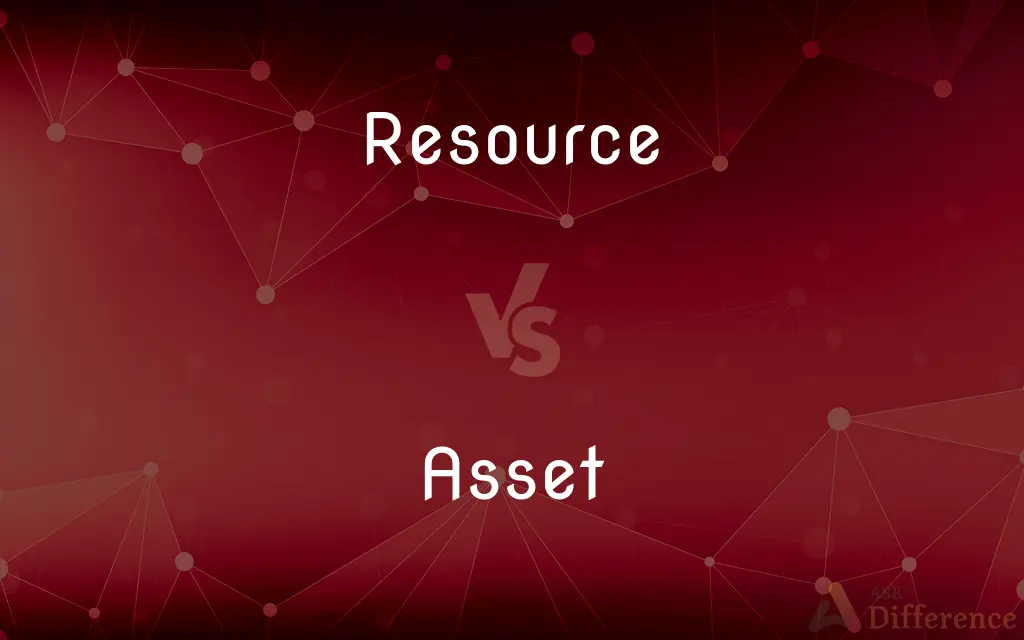Resource vs. Asset — What's the Difference?
By Maham Liaqat & Urooj Arif — Updated on March 21, 2024
A resource is a source or supply from which benefit is produced, typically not owned, while an asset is owned and has economic value to an individual or entity.

Difference Between Resource and Asset
Table of Contents
ADVERTISEMENT
Key Differences
Resources and assets are fundamental concepts in both everyday and business contexts, often used to describe items of value. However, their meanings and applications differ. For example, sunlight and wind are resources that can be used to generate power but are not owned by anyone. On the other hand, assets are specifically owned resources that hold economic value. Assets can be tangible, such as real estate and equipment, or intangible, such as patents and copyrights. The key distinction is ownership and the potential to provide future economic benefits to the owner.
Resources refer broadly to any source or supply that can be used when needed to achieve a goal or benefit. These can be natural, human, or financial, and they are not necessarily owned by an individual or entity. For instance, a company's building is an asset because it is owned by the company and contributes to its operations and income generation.
The role and management of resources and assets also differ. Resources, especially natural and human resources, must often be managed sustainably to ensure their availability for future use. This management can involve conservation efforts, investment in human capital, and strategies to maximize efficiency. Assets, being owned, require management to maintain or increase their value, involving investment decisions, maintenance, and strategic deployment to generate income or other benefits.
The concept of value is central to both resources and assets but is applied differently. The value of resources is in their potential to contribute to production and achievement of objectives. This potential might not always be quantifiable in monetary terms. Assets, however, are quantified based on their economic value to the owner, reflected in financial statements for businesses or personal financial accounts for individuals.
The legal and economic implications of resources and assets highlight their differences. Resources such as air, water, or public parks are often subject to regulations that govern their use and conservation, reflecting their shared or public value. Assets, being owned, are subject to property rights and can be bought, sold, or used as collateral in financial transactions. This ownership confers specific legal rights and responsibilities, including taxation and the ability to derive income or other benefits.
ADVERTISEMENT
Comparison Chart
Definition
A source or supply used to achieve benefits
An owned resource with economic value
Ownership
Not necessarily owned
Owned by an individual or entity
Types
Natural, human, financial
Tangible, intangible
Management
Sustainable use and conservation
Maintenance, value enhancement
Value
Potential to contribute to objectives
Economic value quantifiable in monetary terms
Legal/Economic Implications
Subject to use and conservation regulations
Subject to property rights, can be traded
Compare with Definitions
Resource
Not limited to physical items; can include skills and abilities.
The teacher's experience is a valuable resource for the school.
Asset
Can be used as collateral in financing.
The business owner used his property as an asset for loan collateral.
Resource
Can be a natural, human, or financial source.
Renewable resources like wind and solar energy are key to sustainable development.
Asset
An owned item of value that can be used to produce more wealth.
The company's factory is its most significant asset.
Resource
The availability or scarcity can impact productivity and objectives.
Water scarcity is a critical resource issue for many regions.
Asset
Management focuses on maintaining or increasing value.
Investing in asset maintenance can prevent value depreciation.
Resource
Anything that can be used to achieve an objective.
The river is an important resource for the town's agriculture.
Asset
Includes both tangible and intangible items.
Patents are valuable intangible assets for many tech companies.
Resource
Often requires management or stewardship.
Sustainable resource management ensures long-term benefits.
Asset
Assets are accounted for and valued in financial statements.
Asset valuation is crucial for a company's financial health.
Resource
Resource refers to all the materials available in our environment which help us to satisfy our needs and wants. Resources can broadly be classified upon their availability — they are classified into renewable and non-renewable resources.
Asset
In financial accounting, an asset is any resource owned or controlled by a business or an economic entity. It is anything (tangible or intangible) that can be used to produce positive economic value.
Resource
Something that is available for use or that can be used for support or help
The local library is a valuable resource.
Asset
A useful or valuable quality, person, or thing; an advantage or resource
Proved herself an asset to the company.
Resource
Often resources An available supply, especially of money, that can be drawn on when needed.
Asset
A valuable item that is owned.
Resource
The ability to deal with a difficult or troublesome situation effectively; resourcefulness
A person of resource.
Asset
A spy working in their own country and controlled by a foreign power or an enemy.
Resource
A means that can be used to cope with a difficult situation; an expedient
Needed all my intellectual resources for the exam.
Asset
(Accounting) The entries on a balance sheet showing all properties, both tangible and intangible, and claims against others that may be applied to cover the liabilities of a person or business. Assets can include cash, stock, inventories, property rights, and goodwill.
Resource
Resources The total means available for economic and political development, such as mineral wealth, labor force, and armaments.
Asset
The entire property owned by a person, especially a bankrupt, that can be used to settle debts.
Resource
Resources The total means available to a company for increasing production or profit, including plant, labor, and raw material; assets.
Asset
A thing or quality that has value, especially one that generates cash flows.
My assets consist of stocks in companies that pay a dividend, and a few apartments that pay me rental income.
Resource
Such means considered individually.
Asset
(accounting) Any item recorded on the left-hand side of a balance sheet.
Resource
Something that one uses to achieve an objective, e.g. raw materials or personnel.
Asset
(software) Any component, model, process or framework of value that can be leveraged or reused.
Resource
A person's capacity to deal with difficulty.
A man or woman of resource
Asset
(espionage) An intelligence asset.
Resource
Something that can be used to help achieve an aim, especially a book, equipment, etc. that provides information for teachers and students.
Asset
Any article or separable part of one's assets.
Resource
(networking) Hardware or software accessible by a computer, network, or another object connected to a computer.
Asset
A useful or valuable quality
Resource
To supply with resources.
Resource
To source anew or differently; to find or provide a new source for.
Resource
That to which one resorts orr on which one depends for supply or support; means of overcoming a difficulty; resort; expedient.
Threat'nings mixed with prayers, his last resource.
Resource
Pecuniary means; funds; money, or any property that can be converted into supplies; available means or capabilities of any kind.
Scotland by no means escaped the fate ordained for every country which is connected, but not incorporated, with another country of greater resources.
Resource
Available source of wealth; a new or reserve supply that can be drawn upon when needed
Resource
A source of aid or support that may be drawn upon when needed;
The local library is a valuable resource
Resource
The ability to deal resourcefully with unusual problems;
A man of resource
Common Curiosities
Is money a resource or an asset?
Money is considered an asset because it is owned and has economic value.
Can an intangible item be an asset?
Yes, intangible items like intellectual property can be assets if they provide economic value to their owner.
Are employees considered assets?
While traditionally not listed as assets on financial statements due to their not being owned, employees can be considered valuable resources due to their skills and contributions to a company.
How does sustainability relate to resources and assets?
Sustainability is important for managing both, ensuring resources are available for future use and assets maintain or increase their value over time.
Why is ownership important in distinguishing resources from assets?
Ownership confers legal rights, control, and the ability to derive economic benefits, distinguishing assets from general resources.
How do assets impact a company's value?
Assets contribute to a company's operational capabilities and financial health, impacting its overall market value.
Can a resource become an asset?
Yes, when a resource is owned and controlled, it becomes an asset. For example, land (a natural resource) becomes an asset when it is owned.
How do natural disasters affect resources and assets?
Natural disasters can deplete or destroy both, impacting availability for production and reducing economic value.
Can the same item be both a resource and an asset?
Yes, depending on context. For example, a company car is an asset to the company and a resource to the employee who uses it.
What is the difference between managing a resource and managing an asset?
Managing a resource often focuses on sustainability and efficiency, while managing an asset focuses on maintaining or increasing its economic value.
What role does asset management play in personal finance?
Effective asset management in personal finance is crucial for wealth accumulation and financial security.
Is a rented property considered an asset?
For the owner, the property is an asset. For the renter, it's a resource used for housing, not owned and therefore not an asset.
Are all assets valuable?
Most assets have economic value, but their value can depreciate over time or become obsolete.
How does the concept of resources and assets apply to environmental conservation?
Conservation efforts often focus on sustainable resource management and protecting natural assets for future generations.
Can digital data be considered an asset?
Yes, digital data, especially if it has value for business operations or decision-making, is considered an intangible asset.
Share Your Discovery

Previous Comparison
Vector vs. Matrix
Next Comparison
Place vs. LandAuthor Spotlight
Written by
Maham LiaqatCo-written by
Urooj ArifUrooj is a skilled content writer at Ask Difference, known for her exceptional ability to simplify complex topics into engaging and informative content. With a passion for research and a flair for clear, concise writing, she consistently delivers articles that resonate with our diverse audience.














































